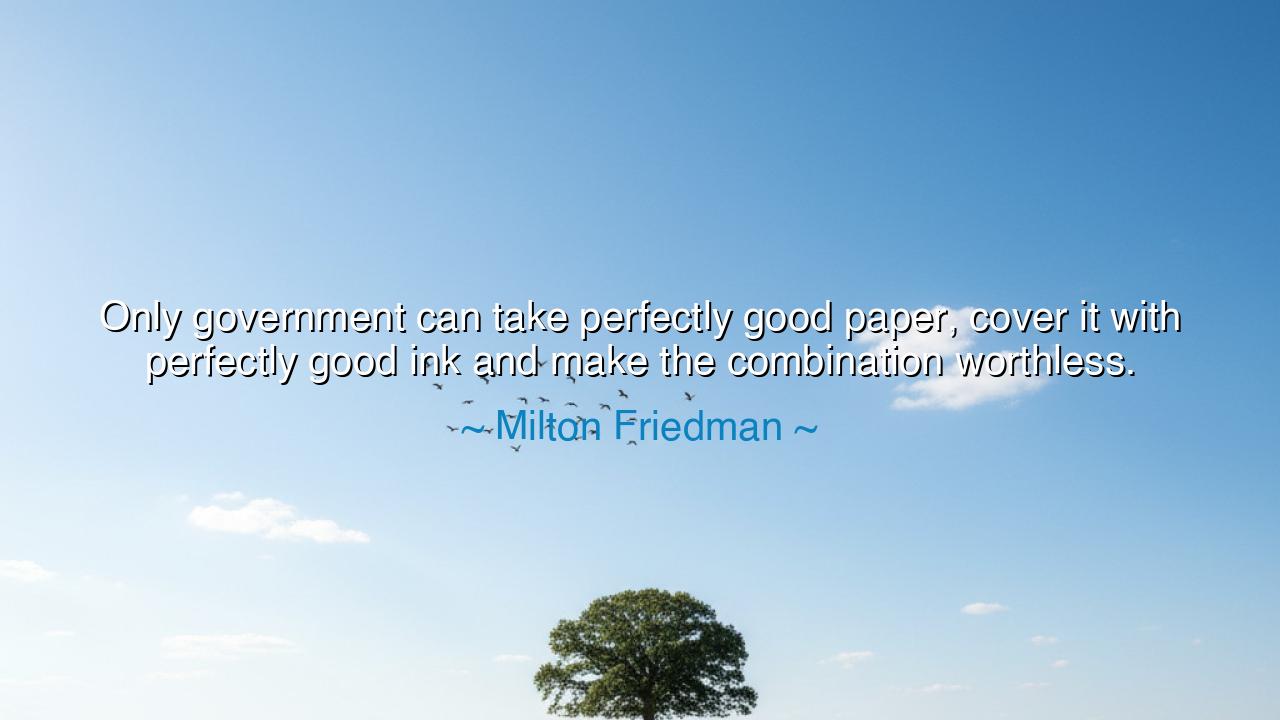
Only government can take perfectly good paper, cover it with
Only government can take perfectly good paper, cover it with perfectly good ink and make the combination worthless.






"Only government can take perfectly good paper, cover it with perfectly good ink and make the combination worthless." – Milton Friedman
In these sharp and timeless words, Milton Friedman, the great economist and champion of free markets, exposes the peril that lies in the hands of unrestrained power. His quote, half jest and half prophecy, is a condemnation of the government’s power to debase money, to transform something of value into something empty through careless policy. With wit as his weapon, Friedman reminds us that inflation is not an accident—it is an act of creation, wrought not by merchants or workers, but by those who command the printing press. The phrase is simple, yet behind its humor lies a warning: when rulers lose discipline, even paper and ink—symbols of knowledge and civilization—can become tools of ruin.
The origin of this quote lies in Friedman’s lifelong battle against the illusions of state-controlled economics. Living through the Great Depression, the Second World War, and the inflationary crises of the 1970s, he witnessed governments across the world print money to cover their debts and purchase false prosperity. As a scholar of monetary theory, Friedman understood that money is not wealth—it is a mirror of trust. When governments print beyond their means, they are not creating wealth, but consuming the moral credit of their people’s labor. His words, therefore, are not only economic—they are ethical. For in his eyes, the destruction of currency was a betrayal of public faith.
To grasp the meaning of his warning, we need only look to Weimar Germany, where in the aftermath of World War I, the printing presses ran day and night. At first, it seemed a solution—debts were paid, workers received wages, and the government appeared triumphant. But within months, the mark had collapsed into dust. Children played with bundles of bills; workers carried their pay in wheelbarrows to buy a loaf of bread. A nation that had once produced music, philosophy, and science found itself bankrupt not only in wealth but in dignity. The paper that once bore the image of a nation’s promise had become worthless ink on worthless fiber—exactly as Friedman warned.
Friedman’s insight also transcends economics. His quote speaks to the universal danger of centralized control and moral complacency. Whenever governments believe they can manipulate truth, value, or virtue with decrees, they sow corruption. The printing of money is but one form of this arrogance—the belief that laws of human nature can be bent without consequence. Just as paper currency loses worth when faith is lost, so too do nations lose honor when they substitute real labor and accountability with illusion and excess. The ink of false promises, no matter how beautifully written, fades quickly in the light of reality.
In this way, Friedman stands in a lineage of ancient moral philosophers who warned against hubris. Like the Greeks who watched their city-states collapse under the weight of arrogance and indulgence, he saw that economic folly is but the modern form of moral decay. The act of printing unearned money mirrors the act of living unearned virtue—it breeds short-term comfort but long-term ruin. True prosperity, he believed, must rise from work, discipline, and trust, not from manipulation. The government that forgets this truth does not enrich its people; it quietly steals from them through the invisible tax of inflation.
Consider also the more recent tragedy of Zimbabwe in the early 21st century. When its leaders flooded the economy with printed notes, inflation soared beyond imagination—so high that prices doubled within hours. Once again, the currency became worthless, not because of lack of paper or ink, but because of lack of integrity. People returned to barter, trading food and fuel for survival. In every such case, the pattern is the same: when governments lose restraint, money ceases to serve the people—it becomes a mockery of itself, a symbol of broken trust.
The lesson, then, is clear and eternal: value cannot be printed; it must be earned. Paper is neutral; ink is innocent; but when combined without wisdom, they become instruments of deceit. A stable currency, like a just society, depends on honesty, discipline, and respect for limits. The worth of money is not in the ink upon it, but in the virtue of the hands that issue it.
And so, the practical actions are these: demand accountability from those who govern; resist the seduction of easy solutions and printed promises; remember that every dollar, every coin, is a token of shared trust between a people and their government. Live within your means, and expect your leaders to do the same. For when restraint fades, collapse follows—and when trust is betrayed, even the finest paper and ink cannot restore what has been lost. Freedom, like currency, is valuable only when guarded with wisdom and courage.






AAdministratorAdministrator
Welcome, honored guests. Please leave a comment, we will respond soon